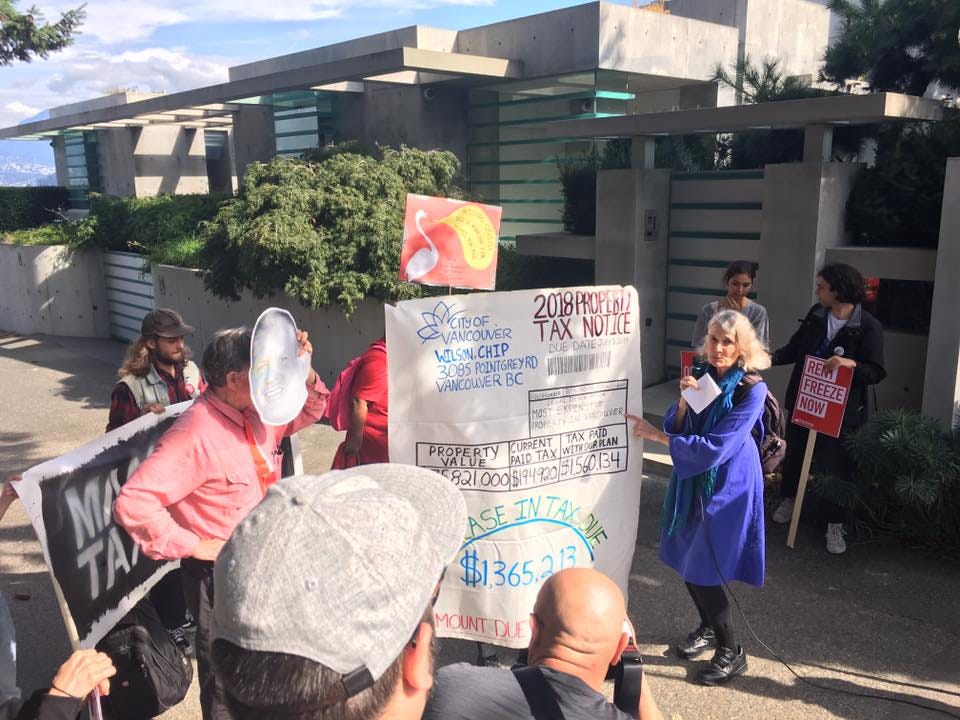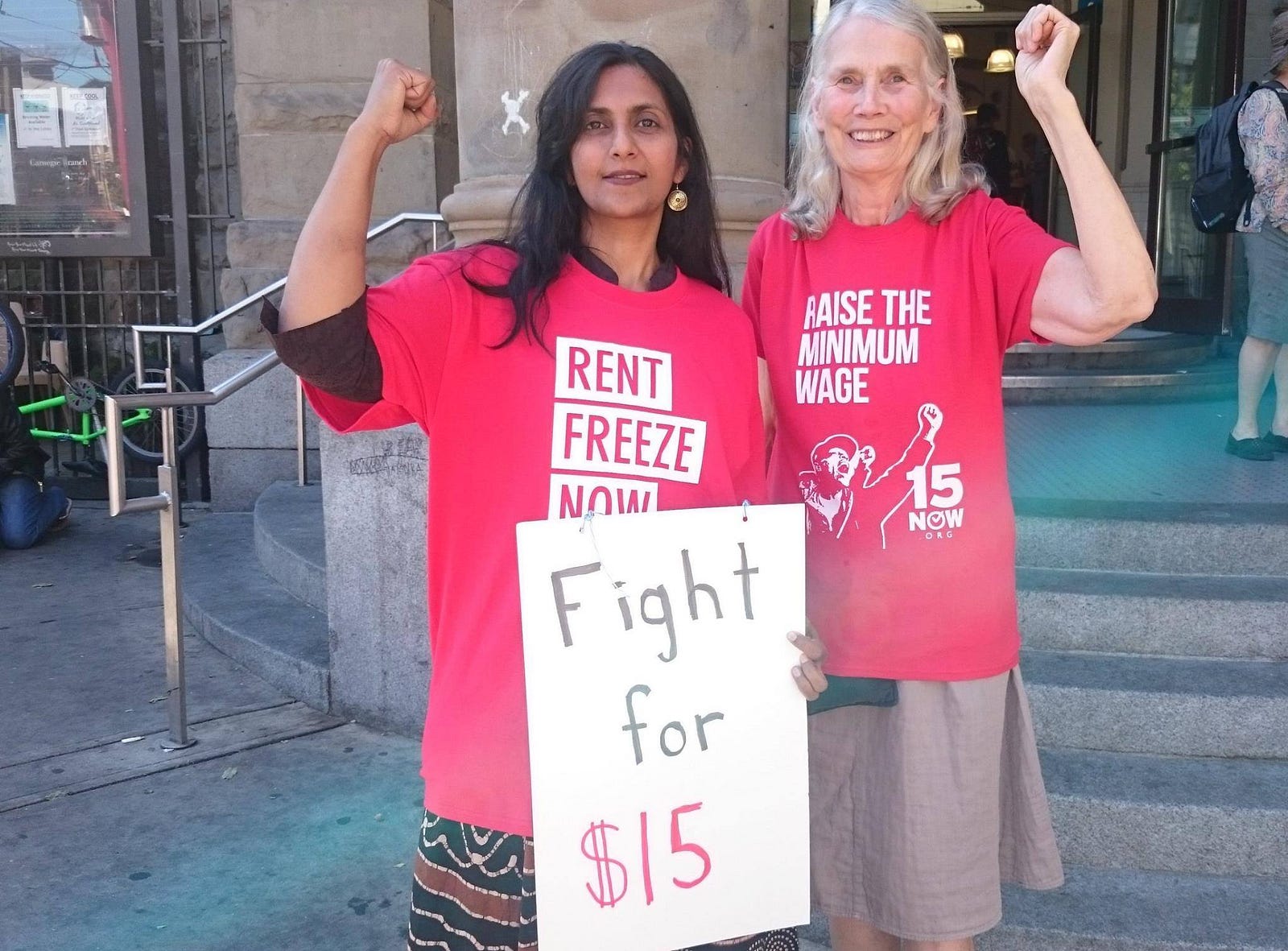Articles Menu
Vancouver’s political revolution has begun. In less than three months a dynamic movement coalesced around Jean Swanson, an incorruptible stalwart of the city’s left who was persuaded to run as an independent in a civic by-election.
With no infrastructure, very little support from organized labour, and without even a campaign manager, Swanson pulled off a strong second place showing in the Oct. 14 election. Her campaign was propelled by a remarkable ad hoc grassroots coalition that saw hundreds of volunteers energetically campaigning for policies like a Rent Freeze and a Mansion Tax. Swanson’s campaign was derided by centre-left opponents as “class warfare,” but it turned out to be just the approach to politics needed in the midst of Vancouver’s out-of-control affordability emergency.

The right-wing NPA’s Hector Bremner was elected with 27% of the vote. Swanson picked up over 10,000 votes (21.36%), finishing a percentage point ahead of the Green Party candidate Pete Fry who had been leading in the only poll taken during the campaign. OneCity Vancouver finished well behind at 13%, and the ruling Vision Vancouver finished a shocking fifth place with only 11% of votes. (The Coalition of Progressive Electors, the historic party of Vancouver’s left that has been devastated by a series of splits over the past dozen years, voted to endorse Swanson rather than run its own candidate — a decision made by the majority of its members against the recommendation of its executive and after rancorous debate at the party’s general meeting.)
After nine years in power, Vision Vancouver seems vulnerable to being swept from power in 2018. The question now is whether they will defeated from the left or the right. If it’s to be the former, Swanson is well positioned to help lead a reconstituted left heading into next year’s elections.
A few other thoughts on the Vancouver by-election:
No one can reasonably blame Jean Swanson for “splitting the left” vote (though some pro-Vision pundits are twisting themselves in pretzels to do so.) Her strong second place finish — with a collective leadership and organization that emerged ex nihilo — shows there’s a big appetite for a left that is the left, for politics that speak to the anger and urgency people in Vancouver feel over the housing and opioid crises.
Vision Vancouver is done, or at least very stale. It’ll be interesting to see how much money they spent on their fifth place finish. There needs to be more serious assessments of its rise and fall, its accomplishments and failures. With developer money soon to be banned from municipal elections — it better be in time for 2018! — there will have to be more rethinks and realignments. The hybrid model of Vision of union and corporate money, with NDP and Liberal staffing, now makes little sense even on its own terms.
I ran into a young Vision canvasser on Election Day and said, “Oh, thanks, but I’m supporting Swanson” and started to walk away. Then she stopped me and asked for my critique of Vision. She was new and didn’t know any of the history, but had noticed a lot of friends supporting Swanson. We had a good conversation.
The strategy of pushing the municipal left to ally with Vision Vancouver is over too, and has proven to be a failure. The candidate backed by the Vancouver & District Labour Council got 13% of the vote; the candidate endorsed by the Vancouver Tenants Union got 21% of the vote. On Election Day, my partner got a text message, a robocall and a glossy flyer in the mail from one of the unions she’s a member of — the HEU. She texted back, “That’s funny, my local is supporting Jean Swanson.” Unions have to be reinvigorated from the bottom-up, and that’s going to have to involve reaching out more to new social movements and to organizing taking place amongst low-income and precariously-housed people in Vancouver.
Twenty-one per cent of voters supported a candidate who was not only calling for a political revolution, but also for taxing the rich to raise funds to acquire land and then give it back to the Indigenous people who are the rightful owners of these territories.
Not a single municipal reporter attended the Swanson election night celebration — the only one covering it was a Langara journalism student who has started her own online publication. Vancouver’s media landscape is a bad joke right now. There’s room for several new media outlets — to say the least!
This was, on a small scale, one of the first proofs of concept that a more Bernie/Corbyn/Melenchon/Sawant type of insurgent left approach can have success at the ballot box in Canada. What Kshama Sawant has accomplished in Seattle is really under appreciated, and she goes well beyond left social democracy by using her elected office to build movements and to popularize an anti-capitalist horizon. Her rally with Jean was one of the highlights of the campaign.

We can have a combative, socialist politics here in Vancouver and elsewhere in Canada too. It’s not an ideological hobby horse or abstraction: the things her campaign were demanding got smeared as “too radical” or as “class war” but in fact corresponded to the real things people want and need to have a slightly less precarious and hard-scrabble life. If anything the demands themselves weren’t radical enough, but the approach resonated with people. As Swanson said time and time again, this campaign was about finally saying what we want and demanding what we need.
Jean Swanson was a reluctant politician, and had to be persuaded by a diverse group of activists to take the plunge back into electoral politics. She should be encouraged by the results she achieved. Her election night celebration on Commercial Drive on Oct. 14 was the most jubilant I’ve ever seen supporters of a candidate who didn’t get elected. It was a feeling of victory in defeat, of a political gamble paying off enough to ante up for a higher stakes game, and something close to certainty that Swanson or someone like her will get elected in 2018. After far too long, Vancouver may finally see the political revolution we desperately need.
(Disclosure: I volunteered on the Swanson campaign, and that’s why I didn’t write about the municipal by-election in my column in The Source / La Source or in Ricochet.)